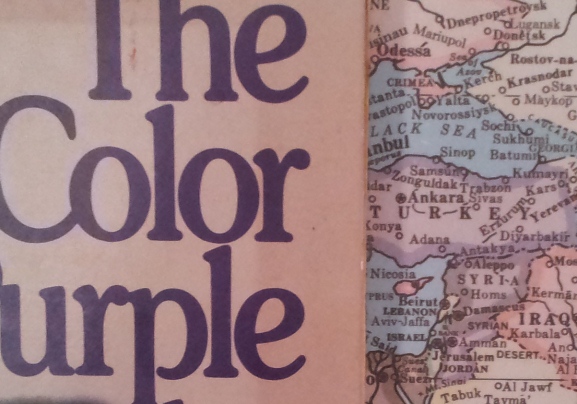In one important respect, fiction writing possesses a crucial advantage over other art forms: its capacity to illuminate the personal, without necessarily losing sight of the wider context within which individual perspective is shaped and experienced is lived. It doesn’t always get there, but the potential for this is always there or thereabouts.
For precisely this reason, The Color Purple is a special book. First and foremost, it is a book about Celie, its heroine: her rape, her marriage to a man who she can never love, the humiliation of caring for her husband’s lover, about her sister, a missionary hopeful that she will find her place in the world through her vocation. But it’s also a book about the eternal struggle that women face in making their voices heard in an often indifferent world; through Celie’s dignity, one appreciates the essential human capacity to find love and redemption in even the most unlikely of circumstances. As a fiction, it refuses to shy away from the complexities of human existence; there are no black and whites, in both the metaphorical and literal sense of the world. Just people, good, bad and on all the points of the continuum in between.
It won’t surprise that Alice Walker, the author of The Color Purple, has over the years become a powerful voice for the oppressed and the disenfranchised. And thus, neither would it surprise that in recent years she has become an active voice in demands for equality of treatment for the Palestinians of the West Bank and Gaza. Her fiction, in the eyes of the public, lends her a moral authority that is not easily ignored.
Of the many strands of advocacy that inhabit the world of Palestinian-Israeli dialogue, Ms. Walker has become a prominent voice in the assertive strain of activism that has made itself evident over recent years. Ms. Walker participated in the abortive flotilla of ships carrying aid and political support to Gaza in 2011; she sat, as a jury member, on the self-described Russell Inquiry, a quasi-judicial panel of inquiry that solicited evidence – after a fashion – of crimes committed by successive Israeli governments against the Palestinian people, and which concluded that Israel as a state was guilty of Apartheid.
In a sense, much of this is irrelevant – well, at least the stridency with which some of these claims have been made and are rejected. It would take a very special – and worrying – person to claim that the relationship as it stands between the inhabitants of historical Palestine are satisfactory. And, provocative as some of the claims made against Israel may be, they form a part of the intricate mosaic that gives understanding of modern Israel. It will never be comfortable to listen to harsh words against the essence of one’s existence. But why should it be? Truth, part truth or not, they do form a part of another person’s reality. They are, at their core, part of the debate and dialogue that is necessary, needed to shape a more optimistic tomorrow.
But there is a difference between contributing to the debate, and shutting it down altogether. Ms. Walker’s activism falls within the ambit of BDS – Boycott, Diversification and Sanctions. Taking inspiration from the cultural boycott of apartheid South Africa in the 1980s, the focal point of the BDS campaign is delegitimization; it unabashedly seeks to draw a stark dichotomy between “supporters” and “opponents” of the State of Israel, and to exclude the former – as defined by the campaign – from debate about the future of this country.
Last week, Ms. Walker turned down a request from Yediot Books in Israel to republish a translation of The Color Purple. In an open letter that has since been widely circulated Ms. Walker re-stated the parallels that she sees between the Israeli government and the apartheid regime of 1980s South Africa. She made reference to her opposition to the screening of the film based on her book in South Africa until after the fall of the apartheid regime: “It is my hope that the non-violent BDS movement, of which I am part, will have enough of an impact on Israeli civilian society to change the situation…I offer an earlier example of The Color Purple’s engagement in the world-wide effort to rid humanity of its self-destructive habit of dehumanizing whole populations.”
“I would so like knowing my books are read by the people of your country, especially by the young, and by the brave Israeli activists (Jewish and Palestinian),” Ms. Walker continues, “for justice and peace I have had the joy of working beside. I am hopeful that one day, maybe soon, this may happen. But now is not the time.”
There are many things that one could say about the analogies that Ms. Walker draws between the two situations: the likelihood – or not – that it would have been possible to screen The Color Purple in South Africa in the first place; the more interesting issue of whether her book would ever have been published in Afrikaans at that particular point in time, whether or not she would have granted permission for this to take place. There is a rich line of discussion waiting to be had about the factors that influenced the cultural boycott of South Africa; Under African Skies, the recent documentary about Paul Simon’s seminal album, Graceland, is again a reminder that not everything that happened 25 years ago was in black and white (pun intended) even then.
But again, this is perhaps something of a digression. There is, however, one fundamental and incontrovertible fact amidst the conjecture and speculation: Ms. Walker does not want her book to be read in Hebrew, even if this is just for the moment.
Let us, for the sake of argument, accept Ms. Walker’s arguments at face value. Israel is fundamentally a discriminatory society. One assumes, one hopes, that change is best effected from the inside, rather than imposed from the outside. The Color Purple gives powerful voice to the dispossessed, illuminates the experience of life on the margins. Does Ms. Walker not think that, one some level, her book might contribute to an understanding in mainstream Israeli society to the experience of the marginalized? Perhaps not. But if that’s the case, then that would be to admit to failure as a writer, as a person who hopes – in the most ambitious and optimistic of ways – that words can change minds.
Or it might be that she thinks that in this particular case, there is no point in trying to evangelize: in a war, there can only be one winner. And, non-violent or not, the situation between Israel and the Palestinians is akin to a state of war. There is something to this, I grudgingly accept: in the sense that it mirrors the most obtuse and intransigent thinking on the right-wing end of the spectrum, one that denies any legitimacy to the Palestinian aspiration for self-autonomy. It’s a matter, if you like, of polar opposites balancing themselves out. But to do as much is reactionary rather than reflective; it strips away complexity and replaces it with facile simplicity, as far away from the nuance and subtlety and richness of experience that characterizes The Color Purple.
Because I’m naive and a romantic, and because I quite like The Color Purple, I’d like to think that even if one person reads the book in its Hebrew translation and thinks a little differently about the world as a result, then it has done a fine job. But that’s not going to happen, not now at least. And Ms. Walker has left our world a little bit poorer as a result.






